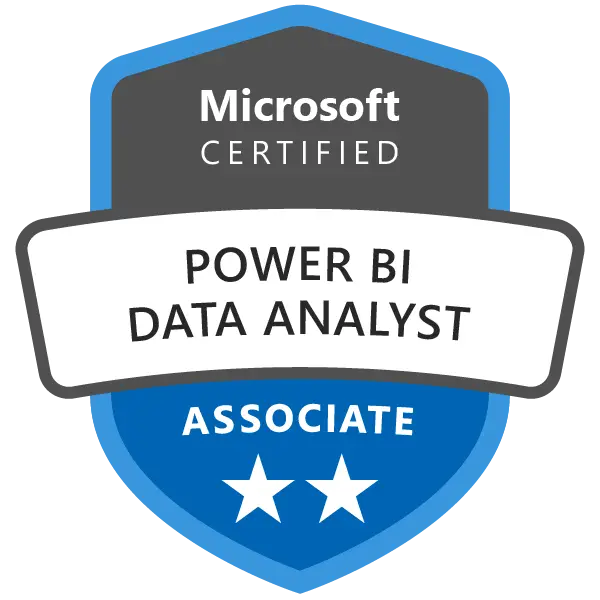
Introduction to Microsoft Power BI Data Analyst (PL-300)
This course covers the various methods and best practices that are in line with business and technical requirements for modeling, visualizing, and analyzing data with Power BI. The course will show how to access and process data from a range of data sources including both relational and non-relational sources. Finally, this course will also discuss how to manage and deploy reports and dashboards for sharing and content distribution.
Training at a glance
Level
Beginner
Duration
3 Days
Experience
1 year: Core Data Concepts
Average Salary
$82,640
Labs
Yes
Level
Beginner
Duration
3 Days
Experience
0 year: Core Data Concepts
Average Salary
$82,640
Labs
Yes
Training Details
This course will discuss the various methods and best practices that are in line with business and technical requirements for modeling, visualizing, and analyzing data with Power BI. The course will also show how to access and process data from a range of data sources including both relational and non-relational data. This course will explore how to implement proper security standards and policies across the Power BI spectrum including datasets and groups. The course will discuss how to manage and deploy reports and dashboards for sharing and content distribution. Finally, this course will show how to build paginated reports within the Power BI service and publish them to a workspace for inclusion within Power BI.
- Examine Microsoft Power Platform
- Describe the business value of the Power Platform
- Explore connectors in Power Platform
- Review using Microsoft Dataverse to organize business data
- Examine how Power Platform works together with Microsoft 365 apps and services
- Explore solutions using Power Platform Microsoft Teams
- Describe how Power Platform works with Dynamics 365
- Describe how Power Platform solutions can consume Azure Services
- Explore how Power Platform apps work together to create solutions
Lesson 2 : Identify foundational components of Microsoft Power Platform
- Discover Microsoft Dataverse
- Learn about the Common Data Model
- Identify tables, columns, and relationships
- Learn about environments
- Discover business rules
Lesson 3 : Describe how to build applications with Microsoft Power Apps
- Examine Power Apps.
- Explore canvas applications
- Explore model-driven applications
- Differentiate between canvas and model-driven applications
- Build a basic canvas app
- Build a basic model-driven app
Lesson 4 : Describe building automation with Microsoft Power Automate
- Examine the capabilities of Power Automate
- Explore the different Power Automate apps
- Examine the components of a cloud flow
- Examine Power Automate scenarios
- Build a basic cloud flow
- Build a basic desktop flow
- Examine the business value provided by Power Automate
Lesson 5 : Describe the capabilities of Microsoft Power BI
- Describe the business value and features of Power BI
- Compare and contrast the different components that make up Power BI
- Describe how to clean and transform data
- Examine how AI insights help detect anomalies and spot trends
- Build a basic dashboard.
- Consume Power BI reports and dashboards
Lesson 6 : Demonstrate the capabilities of Microsoft Power Pages
- Explore Power Pages
- Describe the business value of Power Pages
- Examine the process for building a basic site
- Describe the use cases for creating sites with Copilot
Lesson 7 : Describe the AI authoring experience in Power Platform
- Describe the capabilities of Copilot Studio and the business value it provides
- Examine the process of building a simple copilot
- Describe the capabilities of AI Builder and the business value it provides
The audience for this course are data professionals and business intelligence professionals who want to learn how to accurately perform data analysis using Power BI. This course is also targeted toward those individuals who develop reports that visualize data from the data platform technologies that exist on both in the cloud and on-premises.
- Understanding core data concepts
- Knowledge of working with relational data in the cloud
- Knowledge of working with non-relational data in the cloud
- Knowledge of data analysis and visualization concepts
- DP-900 Microsoft Azure Data Fundamentals is recommended
Upcoming Classes
We Offer More Than Just Microsoft Training
Our successful training results keep our corporate and military clients returning. That’s because we provide everything you need to succeed. This is true for all of our courses.
Strategic Planning & Project Management
From Lean Six Sigma to Project Management Institute Project Management Professional, Agile and SCRUM, we offer the best-in-class strategic planning and project management training available. Work closely with our seasoned multi-decade project managers.
IT & Cybersecurity
ATA is the leading OffSec and Hack the Box US training provider, and a CompTIA and EC-Council award-winning training partner. We offer the best offensive and defensive cyber training to keep your team ahead of the technology skills curve.
Leadership & Management
Let us teach your team the high-level traits and micro-level tools & strategies of effective 21st-century leadership. Empower your team to play to each others’ strengths, inspire others and build a culture that values communication, authenticity, and community.
